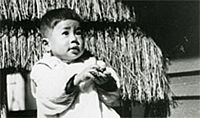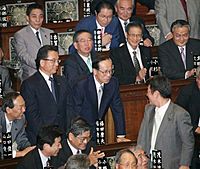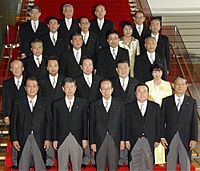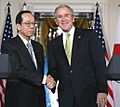Yasuo Fukuda facts for kids
Quick facts for kids
Yasuo Fukuda
|
|
|---|---|
|
福田 康夫
|
|
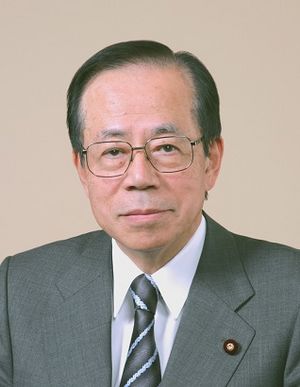
Official portrait, 2007
|
|
| Prime Minister of Japan | |
| In office 26 September 2007 – 24 September 2008 |
|
| Monarch | Akihito |
| Preceded by | Shinzo Abe |
| Succeeded by | Tarō Asō |
| President of the Liberal Democratic Party | |
| In office 23 September 2007 – 22 September 2008 |
|
| Secretary-General |
|
| Preceded by | Shinzo Abe |
| Succeeded by | Tarō Asō |
| Chief Cabinet Secretary | |
| In office 27 October 2000 – 7 May 2004 |
|
| Prime Minister | Yoshirō Mori Junichiro Koizumi |
| Preceded by | Hidenao Nakagawa |
| Succeeded by | Hiroyuki Hosoda |
| Member of the House of Representatives | |
| In office 18 February 1990 – 16 November 2012 |
|
| Preceded by | Multi-member district |
| Succeeded by | Tatsuo Fukuda |
| Constituency | Gunma 3rd (1990–1996) Gunma 4th (1996–2012) |
| Majority | 118,517 (62.83%) |
| Personal details | |
| Born | 16 July 1936 Takasaki, Empire of Japan |
| Political party | Liberal Democratic |
| Spouse |
Kiyoko Fukuda
(m. 1966) |
| Children | 1 (Tatsuo) |
| Parent | Takeo Fukuda |
| Alma mater | Waseda University |
Yasuo Fukuda (福田 康夫, Fukuda Yasuo, born 16 July 1936) is a Japanese politician. He served as the Prime Minister of Japan from 2007 to 2008. Before becoming Prime Minister, he was the Chief Cabinet Secretary for a long time, from 2000 to 2004. He worked under Prime Ministers Yoshirō Mori and Junichiro Koizumi in this role.
After Prime Minister Shinzo Abe resigned, Fukuda was chosen to lead the Liberal Democratic Party. He then became Prime Minister in September 2007. Yasuo Fukuda was special because he was the first son of a former Japanese Prime Minister (Takeo Fukuda) to also become Prime Minister. He resigned on September 1, 2008, and Tarō Asō took his place.
Contents
Early Life and Education
Yasuo Fukuda was born in Takasaki, Gunma, Japan. He is the oldest son of Takeo Fukuda, who later became Japan's 67th Prime Minister. Yasuo grew up in Setagaya, Tokyo.
He went to Azabu High School and then studied at Waseda University. He graduated in 1959 with a degree in economics. After university, he started working at Maruzen Petroleum, which is now part of the Cosmo Oil Company. For about 17 years, he worked as a typical Japanese "salaryman," which means a business professional. He spent some time in the United States from 1962 to 1964. When his father, Takeo Fukuda, was Prime Minister from 1976 to 1978, Yasuo worked as his political secretary.
Political Career
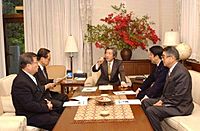
Yasuo Fukuda began his career in national politics in 1990 when he won a seat in the House of Representatives. This is one of the two houses of Japan's parliament.
In 1997, he became a deputy director of the Liberal Democratic Party (LDP). The LDP is one of Japan's major political parties. In October 2000, he became the Chief Cabinet Secretary for Prime Minister Yoshirō Mori. The Chief Cabinet Secretary is a very important role, acting as the government's main spokesperson and coordinator. He continued in this role under Prime Minister Junichiro Koizumi. He resigned from this position in May 2004.
Fukuda was considered a possible leader for the LDP in 2006, but he decided not to run. Instead, Shinzō Abe became the leader and Prime Minister. Fukuda believed that prime ministers should not visit Yasukuni Shrine, a controversial war memorial. He joined other lawmakers in suggesting a different, non-religious place for remembrance.
Becoming Prime Minister
After Prime Minister Abe resigned in September 2007, Yasuo Fukuda announced he would run for the leadership of the Liberal Democratic Party. Since the LDP had the most seats in the House of Representatives, their leader would become the next Prime Minister.
Fukuda had a lot of support from many parts of his party. His only opponent was Tarō Asō. On September 23, Fukuda won the election, receiving 330 votes compared to Aso's 197.
On September 25, Fukuda was officially elected as Japan's 91st Prime Minister by the House of Representatives. The other house of parliament, the House of Councillors, chose a different person, but the Constitution of Japan states that the choice of the House of Representatives is final in such cases. Emperor Akihito officially swore in Fukuda and his cabinet on September 26.
Censure Motion
In June 2008, the opposition parties in the upper house of parliament passed a "censure motion" against Prime Minister Fukuda. This motion was a way for them to show they disagreed with his handling of certain issues, like a new medical plan. It was the first time such a motion was passed against a prime minister in Japan's history after World War II.
Confidence Motion
The next day, the ruling parties in the lower house passed a "motion of confidence" to support Fukuda. This showed that his own party still had faith in him.
Resignation as Prime Minister
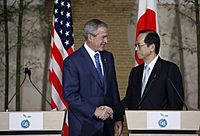
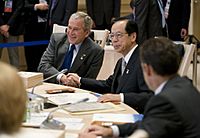
On September 1, 2008, Yasuo Fukuda suddenly announced that he would resign as Prime Minister. He said he was doing this to help the political process work better. He explained that there was a lot of disagreement between his party and the opposition, which made it hard to pass new laws and carry out policies. He felt that a new leader was needed to move things forward for the Japanese people.
His resignation led to another leadership election within the LDP. Tarō Asō was chosen to replace him and became the new Prime Minister on September 24, 2008.
International Relations
Even after his time as Prime Minister, Fukuda continued to be involved in important international discussions.
In June 2014, he visited Beijing for private meetings with Chinese government officials. These meetings helped to set up a meeting between the Japanese Prime Minister Shinzō Abe and Chinese President Xi Jinping later that year. This was an important step in improving relations between the two countries.
In 2018, Fukuda met with Chinese Foreign Minister Wang Yi during a meeting between business leaders and former officials from China and Japan. In July 2019, he spoke at a forum in Hong Kong about trade relations between China and the United States. He encouraged China to think carefully about its role in the world, saying that its actions affect not only the US and China but the whole world.
After Politics
After leaving politics in 2012, Yasuo Fukuda became the President of the Japan-Indonesia Association. This organization works to build stronger ties between Japan and Indonesia.
Cabinet Members
Yasuo Fukuda's cabinet was formed on September 26, 2007. It was very similar to the cabinet of the previous Prime Minister, Shinzo Abe. He later changed some of his cabinet members on August 1, 2008.
| Secretary | Nobutaka Machimura |
|---|---|
| Internal Affairs | Hiroya Masuda |
| Justice | Kunio Hatoyama |
| Foreign Affairs | Masahiko Kōmura |
| Finance | Fukushiro Nukaga |
| Education | Kisaburo Tokai |
| Health | Yōichi Masuzoe |
| Agriculture | Masatoshi Wakabayashi |
| Economy | Akira Amari |
| Land | Tetsuzo Fuyushiba |
| Environment | Ichirō Kamoshita |
| Defense | Shigeru Ishiba |
| Public Safety, Disaster Prevention |
Shinya Izumi |
| Economic Policy | Hiroko Ōta |
| Financial Services, Administrative Reform |
Yoshimi Watanabe |
| Okinawa and Northern Territories, Technology Policy, Regulatory Reform |
Fumio Kishida |
| Population, Youth and Gender Equality | Yōko Kamikawa |
Images for kids
-
Fukuda and US president George W. Bush exchange handshakes following their joint statement at the White House, November 16, 2007
-
Robert Gates meets with Yasuo Fukuda
Awards and Honors
In March 2008, the President of Croatia, Stjepan Mesić, gave Yasuo Fukuda a special award called the Grand Order of Queen Jelena with the Sash and the Croatian Morning Star. This award was given to him for his efforts in making the relationship between Japan and Croatia stronger and friendlier.
See also
 In Spanish: Yasuo Fukuda para niños
In Spanish: Yasuo Fukuda para niños
- Tokyo International Conference on African Development (TICAD-IV), 2008.
 | Georgia Louise Harris Brown |
 | Julian Abele |
 | Norma Merrick Sklarek |
 | William Sidney Pittman |


